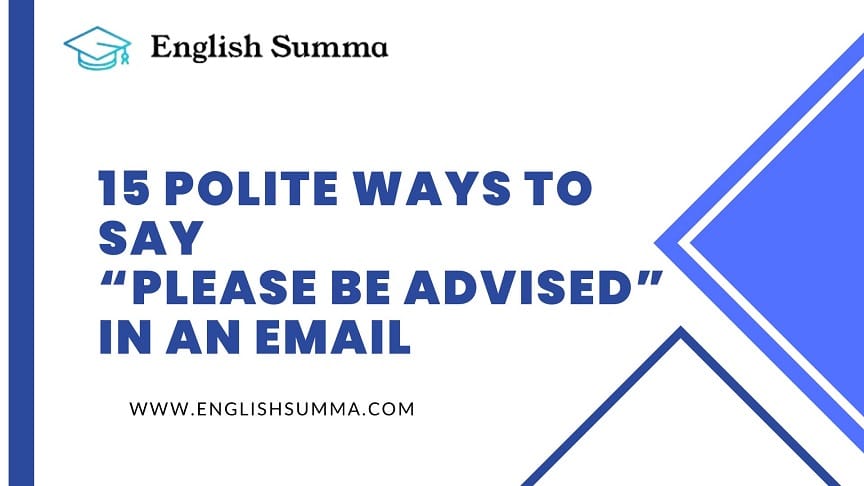In the realm of professional communication, expressing information with politeness is crucial. It not only enhances the tone of your message but also fosters a positive and respectful relationship with your recipients. One common phrase used to convey important information is “please be advised.” However, using this expression repeatedly can make your emails sound monotonous. To add variety and maintain a professional demeanor, here are 15 Polite Ways to Say “Please Be Advised” in an Email to convey the same message with politeness.
Is Saying ‘Please Be Advised’ Considered Rude?
Saying “Please be advised” is not inherently rude, but its formality may come across as assertive. Depending on the context and your relationship with the recipient, it might be perceived as overly formal. Consider using more conversational alternatives like “FYI” or “Just a heads up” to maintain a friendly tone in less formal communication. Adjusting your language based on the situation ensures effective and considerate communication.
Now let’s learn Polite Ways to Say “Please Be Advised” in an Email.
1. Kindly Note: A Gentle Approach
Starting an email with “Kindly note” is a subtle and refined way to bring attention to important information. For instance:
Subject: Regarding Upcoming Team Meeting
Dear Alice,
Kindly note that the upcoming team meeting has been rescheduled to 2:00 PM on Friday, January 20th. Your presence is highly appreciated.
Best regards,
John
2. For Your Information: Sharing Details Professionally
The phrase “For your information” is widely accepted in professional communication. It gracefully informs the recipient without sounding too formal. Consider this example:
Subject: Project Update
Dear Mr. Smith,
I hope this email finds you well. For your information, the project deadline has been extended by a week due to unforeseen circumstances. We appreciate your understanding.
Best regards,
Emma
Learn Other Ways to Say “I Look Forward to Speaking with You”
3. I Want You to Know: A Personal Touch
Adding a touch of personalization to your message can make it more engaging. “I want you to know” is a phrase that accomplishes this while maintaining professionalism. Here’s an example:
Subject: Important Announcement: Company Policy Update
Dear Team,
I want you to know that effective from next month, there will be changes in the company’s remote work policy. Please review the attached document for detailed information.
Warm regards,
David
4. Please Be Aware: A Direct Yet Polite Request
When you need to convey urgency, “Please be aware” is a concise and respectful way to inform your recipients. Consider this scenario:
Subject: Urgent: IT System Maintenance Tomorrow
Dear Rachel,
Please be aware that there will be scheduled maintenance of our IT systems tomorrow from 10:00 AM to 2:00 PM. Kindly ensure all necessary precautions are taken to minimize disruption.
Thank you,
Michael
Best Formal Ways to Say “Thanks for the Reminder” in an Email
5. Bear in Mind: Encouraging Consideration
Encouraging your recipients to “bear in mind” the information conveys a sense of shared responsibility. For example:
Subject: Reminder: Expense Report Submission Deadline
Dear Cynthia,
As we approach the end of the month, bear in mind that the deadline for submitting expense reports is on the 28th. Your prompt cooperation is highly appreciated.
Best regards,
Alex
6. Note: Simple and Effective
Using the word “Note” in your communication is a straightforward yet effective way to draw attention to essential information. Consider this example:
Subject: Meeting Room Reservation Update
Dear James,
Note that the meeting room reservation for tomorrow has been moved to Room 203. We apologize for any inconvenience.
Regards,
Sarah
7. Inform: Conveying Information Clearly
Sometimes, a simple “inform” suffices to convey the intended message in a clear and concise manner. For instance:
Subject: Important Client Visit: Informing All Departments
Dear Team,
I would like to inform all departments that we have a crucial client visit scheduled for next Tuesday. Your cooperation in maintaining a tidy and professional workspace is highly appreciated.
Thank you,
Olivia
8. Alternative: A Flexible Option
Ending with a word like “alternative” provides flexibility in your communication, indicating that there are choices or options available. Here’s an example:
Subject: Alternative Approaches to Project Implementation
Dear Mark,
In our recent team meeting, we discussed alternative approaches to project implementation. Please review the attached document and share your thoughts by Friday.
Best,
Lisa
9. Gentle Reminder: Softly Nudging Attention
Subject: Gentle Reminder: Training Session Tomorrow
Dear Emily,
As a gentle reminder, we have a mandatory training session scheduled for tomorrow at 9:00 AM in the conference room. Your presence is highly valued.
Warm regards,
Daniel
10. Request Your Attention: Seeking Consideration
Subject: Request Your Attention: Document Approval Needed
Dear Mr. Johnson,
I hope this message finds you well. We kindly request your attention to review and approve the attached document at your earliest convenience.
Best regards,
Hannah
11. Noteworthy: Signifying Importance with Grace
Subject: Noteworthy Update: Quarterly Report
Dear Team,
I trust you’re doing well. I wanted to bring to your attention a noteworthy update: the quarterly report has been published and is available for your review.
Kind regards,
Samuel
12. Urgent Notice: Conveying Timeliness
Subject: Urgent Notice: Policy Change Implementation
Dear Jessica,
An urgent notice for all employees: the recent policy changes will be implemented starting next week. Please familiarize yourself with the updated policies attached herewith.
Best,
Amanda
13. Heads Up: Providing Advance Notice Casually
Subject: Heads Up: Team Building Event Next Week
Hi Alex,
Just a quick heads up that our much-anticipated team building event is scheduled for next Friday. Details will follow in a separate email. Get ready for a fun day!
Cheers,
Sophie
14. Important Point to Consider: Encouraging Reflection
Subject: Important Point to Consider: Project Proposal
Dear Chris,
I hope this message finds you in good spirits. I wanted to highlight an important point to consider regarding the project proposal attached. Your insights are invaluable.
Warm regards,
Eleanor
15. Drawing Your Attention: Making Information Noticeable
Subject: Drawing Your Attention: Revised Travel Guidelines
Dear Team,
I trust you’re well. This email is aimed at drawing your attention to the revised travel guidelines. Please take a moment to review the changes outlined in the attached document.
Best, Michael
In conclusion, while “please be advised” remains a valid phrase in professional emails, incorporating these alternatives can add variety and a personal touch to your communication. Experimenting with different expressions allows you to tailor your message to the specific tone and context of each email, fostering a more engaging and respectful dialogue in the professional sphere.

Emily Hudson, the creative mind behind “English Summa,” is a passionate English language educator with a Bachelor’s Degree in English and a Teaching Certification. Dedicated to making the intricacies of English accessible to learners, Emily brings a blend of expertise and enthusiasm to her readers. Follow English Summa for insightful language tips, literary explorations, and a shared love for the beauty of English.

